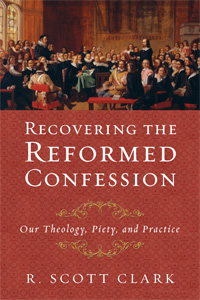Beza believed that this natural law of sovereignty had been evident in the Jewish monarchies of the Old Testament and was borne out in contemporary European politics. He placed several caveats on this principle, however: first, the king must be guilty of . . . Continue reading →
Machen: The Key Verse Of Galatians
“I do not make void the grace of God; for if righteousness is through the law, then Christ died in vain” (Galatians 2:21) “I do not make void the grace of God,” says Paul in concluding the report of his speech to . . . Continue reading →
Grammar Guerilla: That That And Had Had (Updated)
Have you ever used, heard, or read these cumbersome constructions: “I had had that same experience but then something else happened” or “She said that that car nearly hit her”? My experience suggests that they are being used more frequently but they . . . Continue reading →
Companion To Reformed Theology Reviewed
—By Jon Hoglund. A good “Companion” introduces one to classic texts in a field and to areas of current debate in scholarly literature. Apart from Richard Muller’s monumental Post-Reformation Reformed Dogmatics, there is no such volume for Reformed history and theology from . . . Continue reading →
Baptism, Election, And The Covenant Of Grace Available
After a summer re-model, the seminary bookstore is back online, which makes it again possible to order copies of Baptism, Election, and the Covenant of Grace more easily. Click on the image for your copy. It’s $1.50 plus shipping. You can also . . . Continue reading →
Machen: Two Reasons For Christian Schools (1933)
The Christian school is to be favored for two reasons. In the first place, it is important for American liberty; in the second place, it is important for the propagation of the Christian religion. These two reasons are not equally important; indeed, . . . Continue reading →
Get Thee To A Library
Reading online is great. It’s fast. It’s convenient. It’s accessible but there’s still a lot of important information that you can’t get from the web. I’m not writing against e-books, even though they still have weaknesses (e.g., footnotes don’t work and reading . . . Continue reading →
Let The Cool Kids Be Cool
…Since the Great Awakening, many American Protestants have allowed market forces to dictate how Christianity is presented to the watching world. That faith once delivered to the saints was repackaged for the Second Great Awakening, kicked up a notch for the great . . . Continue reading →
Reformed Is A Confession More Than A Culture
These arguments often come down to definitions. If we define culture as the sum of a series of factors including language, a web of relationships (family, community), that shapes the way we think about food, clothing, and work then culture is one . . . Continue reading →
Sayers On The Disillusionment Of Our Time
Or—and this commonly happens in periods of disillusionment like our own, when philosophies are bankrupt and life appears without hope—men and women may turn to lust in sheer boredom and discontent, trying to find in it some stimulus which is not provided . . . Continue reading →
Are There Two Distinct Reformed Views Of The Sabbath?
Does The Continental View Really Exist?
On Twitter Anthony Bradley pointed us to a webpage by Ra McLaughlin on the Sabbath. There is good material there but there are also a couple of items that warrant discussion. The one on which I want to focus in this post . . . Continue reading →
1 Clement On Justification
CHAPTER 31: THE MEANS BY WHICH OBTAIN DIVINE BLESSING Let us cleave then to His blessing, and consider what are the means of possessing it. Let us think over the things which have taken place from the beginning. For what reason was . . . Continue reading →
Heidelcast 37: Around The Horn And The Globe With NAPARC
The Heidelcast answers a phone call asking about NAPARC and what distinguishes the various confessional Reformed denominations and federations from each other. Thanks to the Rev Dr David Hall, Sr Pastor of Midway Presbyterian Church, (PCA) in Powder Springs, GA, the Rev Mr . . . Continue reading →
Heidelcast 35: Zeke Takes Us Behind The Scenes As The World Ends (Updated)
If you’ve been following the HB, the Heidelcast has been in re-runs for several months. Today, however, the Heidelcast is back with a brand new episode. Earlier this week I talked with Zeke Piestrup about his new documentary, “Apocalypse Later: Harold Camping . . . Continue reading →
Not A Ladder But A Cross
“17. Why must he also be true God? That by the power of His Godhead He might bear in His manhood the burden of God’s wrath, and so obtain for and restore to us righteousness and life.” Almost from the beginning of . . . Continue reading →
On The Writing Of Essays
Revised 9 September 2020 It is the bane of every student that every professor has his idiosyncratic requirements. Here are mine. I. Essays: Clear, Concise, and Cogent To be successful, essays in this course must be clear, concise, and cogent.1 An essay is clear . . . Continue reading →
New Tool For The Study Of Reformed Orthodoxy
By David Systsma—Scholars now have a new tool for the early modern religious and philosophical history in its academic context. From the beginning of the Reformation at the University of Wittenberg to the establishment of the Academy of Geneva, schools were integral . . . Continue reading →
Introduction To The Heidelberg Catechism
In March I promised to post this and then promptly forgot. I was asked to write a brief introduction to the Heidelberg Catechism for a Danish translation of the catechism. Here it is. § Introduction Considering its principals, the Heidelberg Catechism (1563) . . . Continue reading →
Or We Could Catechize Them
I ask nothing of you in the way of a declared position on religion. Your mother may have demanded more of you here,—entreated more; I cannot. I ask but this: that you will give earnest, serious consideration to the fact that we . . . Continue reading →
One Reason Why Unbelievers Don’t Want to Talk to Us
Mark Vander Pol recently pointed us to a wiki page titled, “How to Avoid Uncomfortable Conversations About Religion.” This page is useful on a variety of levels. On the most common level, some people are pests and it offers some good advice for dealing . . . Continue reading →










